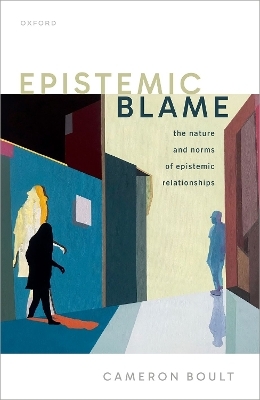
Epistemic Blame
Oxford University Press (Verlag)
978-0-19-289058-0 (ISBN)
Epistemic Blame is the first book-length philosophical examination of our practice of criticizing one another for epistemic failings. People clearly evaluate and critique one another for forming unjustified beliefs, harbouring biases, and pursuing faulty methods of inquiry. But what is the nature of this criticism? Does it ever amount to a kind of blame? And should we blame one another for epistemic failings? Through careful analysis of the concept of blame, and the nature of epistemic normativity, this book argues that there are competing sources of pressure inherent in the increasingly prominent notion of "epistemic blame". The more genuinely blame-like a response is, the less fitting in the epistemic domain it seems; but the more fitting in the epistemic domain a response is, the less genuinely blame-like it seems. These competing sources of pressure comprise a puzzle about epistemic blame. The most promising resolution of this puzzle lies in the interpersonal side of epistemic normativity. Drawing on work by T. M. Scanlon, R. J. Wallace, and others, Cameron Boult argues that members of epistemic communities stand in "epistemic relationships", and epistemic blame just is a way of modifying these relationships. By thinking of epistemic blame as a distinctive kind of relationship modification, we locate a response that is both robustly blame-like, and distinctly epistemic. The result is a ground-breaking new theory of epistemic blame, the relationship-based account. With a solution to the puzzle of epistemic blame in hand, a new project for social epistemology comes into view: the ethics of epistemic blame. Boult demonstrates the power of the relationship-based account to contribute to this project, develops a systematic analysis of standing to epistemically blame, and defends the value of epistemic blame in our social and political lives. He shows that epistemic relationships can also be used to illuminate foundational questions about epistemic normativity, responsibility for our beliefs and assertions, and a wide range of epistemic harms, such as epistemic exploitation and gaslighting. Throughout the investigation, a more structured and precise understanding of the parallels and points of interaction between the epistemic and practical domains emerges.
Cameron Boult is an Associate Professor of Philosophy at Brandon University, Canada, and Research Associate at the African Centre for Epistemology and Philosophy of Science, University of Johannesburg. He primarily works on social epistemology, political epistemology, and foundational issues in epistemic normativity. He has published widely on these topics. He is co-founder of the Epistemic Wrongs, Blame, and Reparations applied epistemology workshop series, and a member of the Epistemic Reparations Global Working Group, Northwestern University. He is a regular visitor and Affiliate Researcher at Cogito Centre for Epistemology, University of Glasgow.
Introduction
1: The Puzzle of Epistemic Blame
2: Negative Emotions and Frustrated Desires
3: A Relationship-Based Account of Epistemic Blame
4: The Significance and Fittingness of Epistemic Blame
5: Blameworthy Belief, Assertion, and Other Epistemic Harms
6: Standing
7: The Value of Epistemic Blame
Conclusion
Bibliography
| Erscheinungsdatum | 23.08.2024 |
|---|---|
| Verlagsort | Oxford |
| Sprache | englisch |
| Maße | 160 x 240 mm |
| Gewicht | 494 g |
| Themenwelt | Geisteswissenschaften ► Philosophie ► Erkenntnistheorie / Wissenschaftstheorie |
| Geisteswissenschaften ► Philosophie ► Ethik | |
| ISBN-10 | 0-19-289058-1 / 0192890581 |
| ISBN-13 | 978-0-19-289058-0 / 9780192890580 |
| Zustand | Neuware |
| Haben Sie eine Frage zum Produkt? |
aus dem Bereich


![Was heißt Denken?. Vorlesung Wintersemester 1951/52. [Was bedeutet das alles?] - Martin Heidegger](/media/113619842)